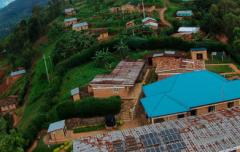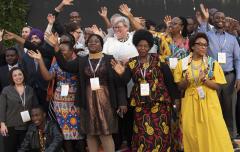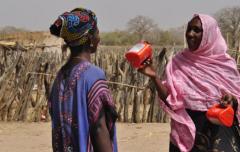Tapping Sustainable Energy in Somalia
Lisbon, Portugal - Somalia’s energy economy is as challenging as you’ll find anywhere. Diesel generators are the country’s biggest power source. Electricity, which is largely non-existent, is prohibitively expensive. Nearly everyone cooks with firewood, charcoal and even animal dung, which cause harmful indoor air pollution.
The Somali government and the United Nations have a bold idea for changing this picture: renewable energy. Earlier this month, three-dozen government officials, NGOs and clean energy businesses met in Lisbon to discuss how to make sustainable energy a bigger reality. The meeting was held as part of the Sustainable Energy for All Forum in Lisbon.
“Sustainable energy could play a very important role in bringing economic opportunity and security to Somalia,” said Michael Keating, Special Representative of the UN Secretary-General for Somalia, a key promoter of the three-hour meeting. “It may seem like a stretch, but it’s not.”
Somalian government officials have a similar vision and they point to a half-dozen projects that have already been built, using wind and off-grid solar, in the capital Mogadishu and parts of Somaliland.
“We have 11 million people without power. That’s an opportunity,” said Abdisalam Abdullahi, project coordinator of the Energy Coordination Unit in the Ministry of Energy and Water Resources of Somalia.
Keating points to the country’s recent rebuilding gains after a protracted civil war, including security improvements in parts of the country, a recent election and an economy that is growing five percent a year. “The country is slowly pulling itself together with an amazing private sector,” he said.
A group of leading edge clean energy companies participated in the meeting. Among those was SolarGen Technologies, which has sold more than 100 solar-powered water irrigation pumps to Somalian farmers and is now installing two solar microgrids in communities north of Mogadishu.
“The environment is improving, but slowly,” said Sean Brooks, director of business development at the company, which has offices in Kenya and Somalia. “We are optimistic that things will continue to improve and maybe at a greater speed under the current government.”
The first microgrid, expected to go on line this spring, is a 35 kilowatt-peak (kWp) system for 175 households in Warsheikh, a coastal town. The project will produce power for about 50 cents/kWH, less than half what people are paying for diesel power. SolarGen will build the microgrid and operate it for two years, before transferring operations and ownership to a community-owned utility.
Another company, Power OffGrid, is selling biomass cookstoves, using food and animal waste as fuel, and small solar systems. “It’s a good market,” said CEO Guled Ahmed, who accepts numerous types of collateral, including goats, to help customers finance their systems.
But scaling these efforts will be a significant challenge. Speakers discussed wide-ranging constraints, including lack of finance, technical capacity and policy gaps and limited road infrastructure.
“The demand is huge, people really want these products,” said Marina Yakhnis, senior renewable energy specialist at RTI International, who decried the lack of consumer finance options.
While conceding that security, infrastructure and government regulation all need to improve, Keating sees lots of opportunities for building on the small energy access gains that have been achieved so far.
“You have a very large Somali community that is ready to invest in the country. You have a government that is up for investment and job creation. And you also have a very permissive environment for business,” he said, in a Facebook Live interview at the SEforALL Forum. “So it’s kind of counter-intuitive. Ironically, Somalia is a great place to get things going.”



